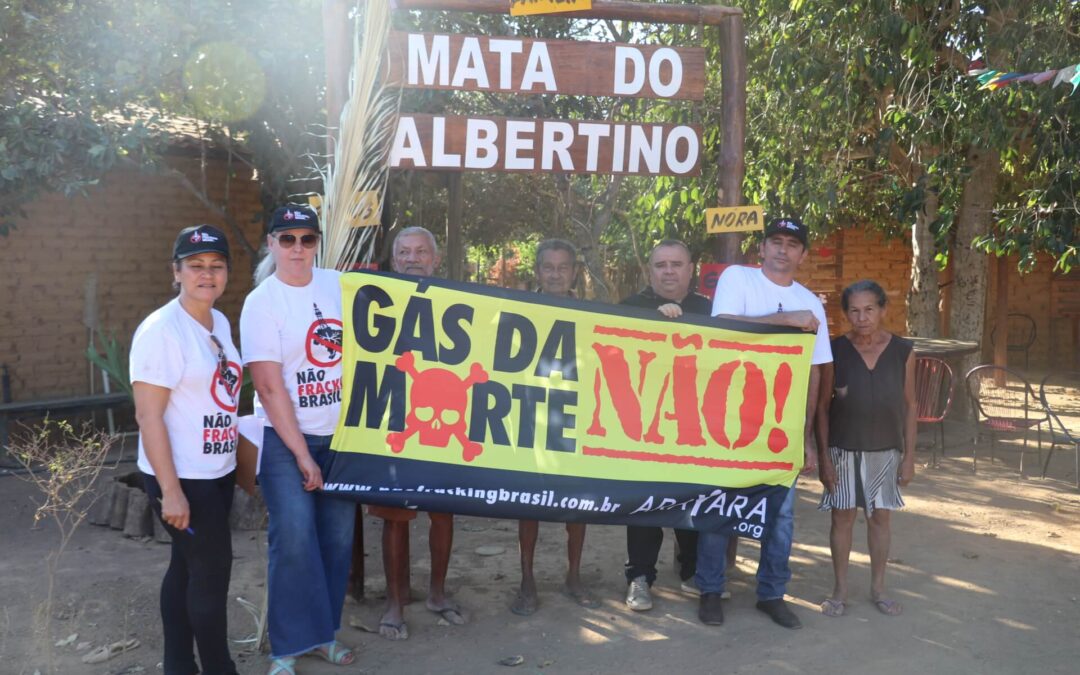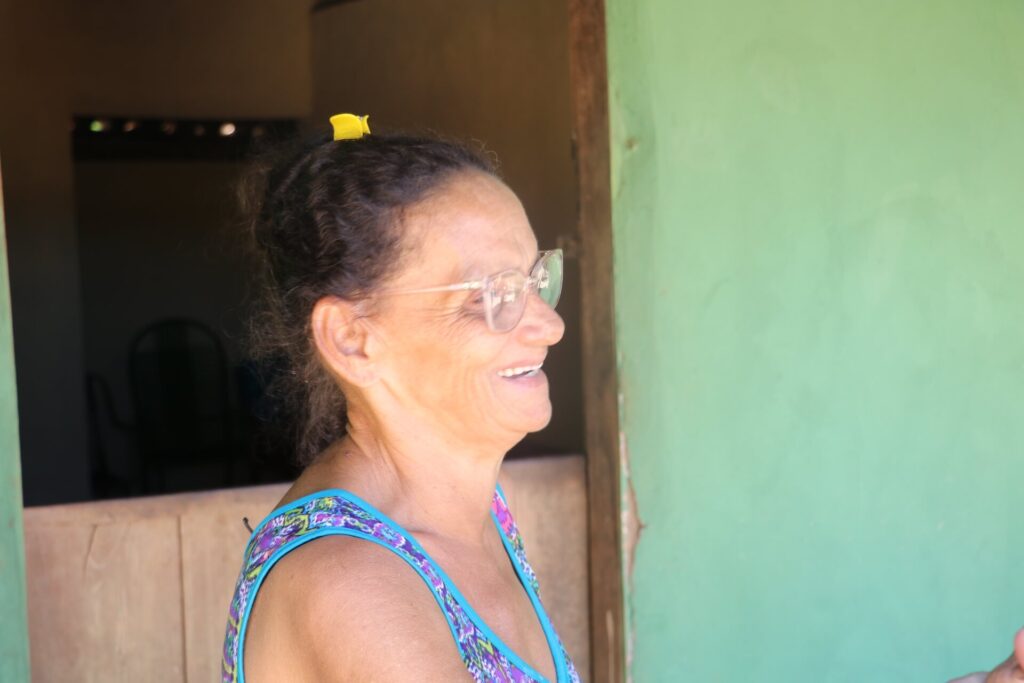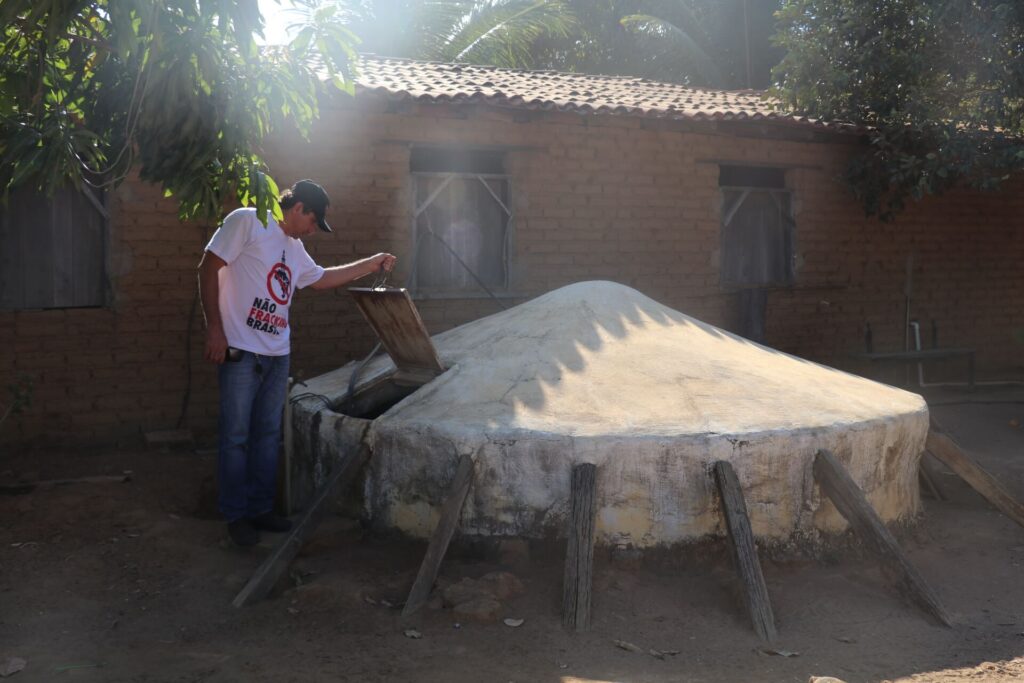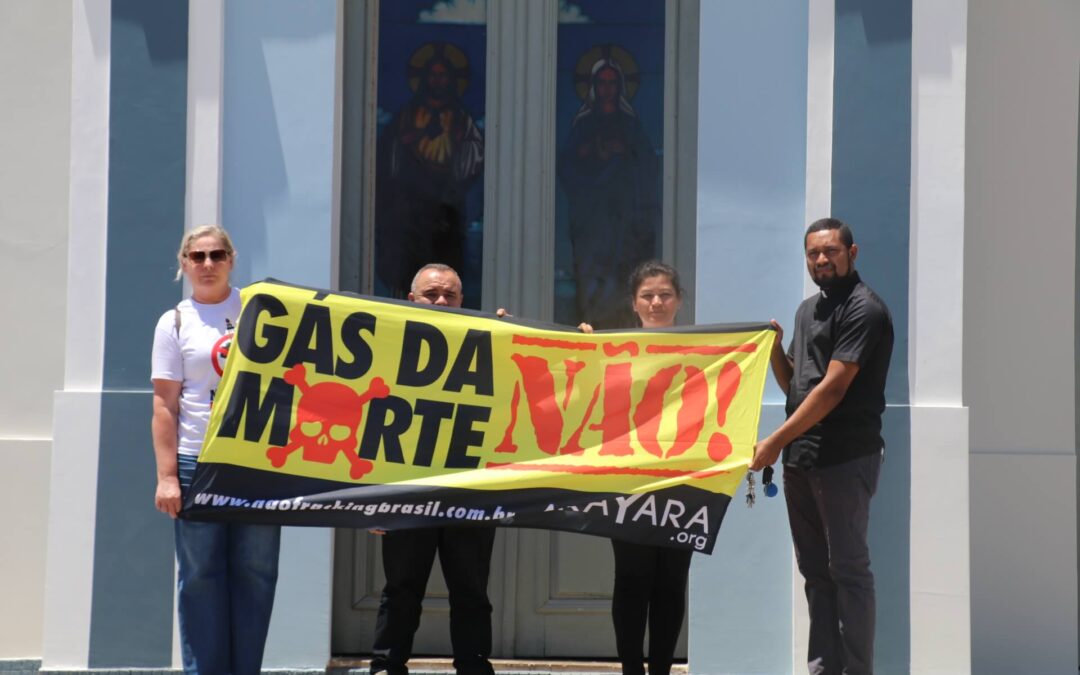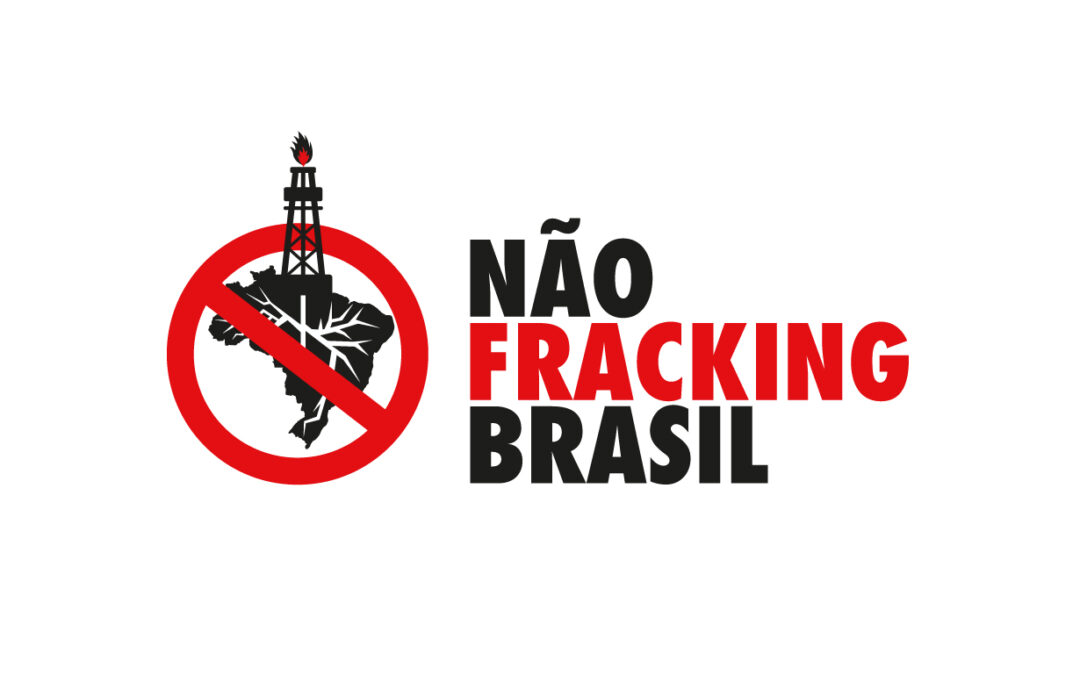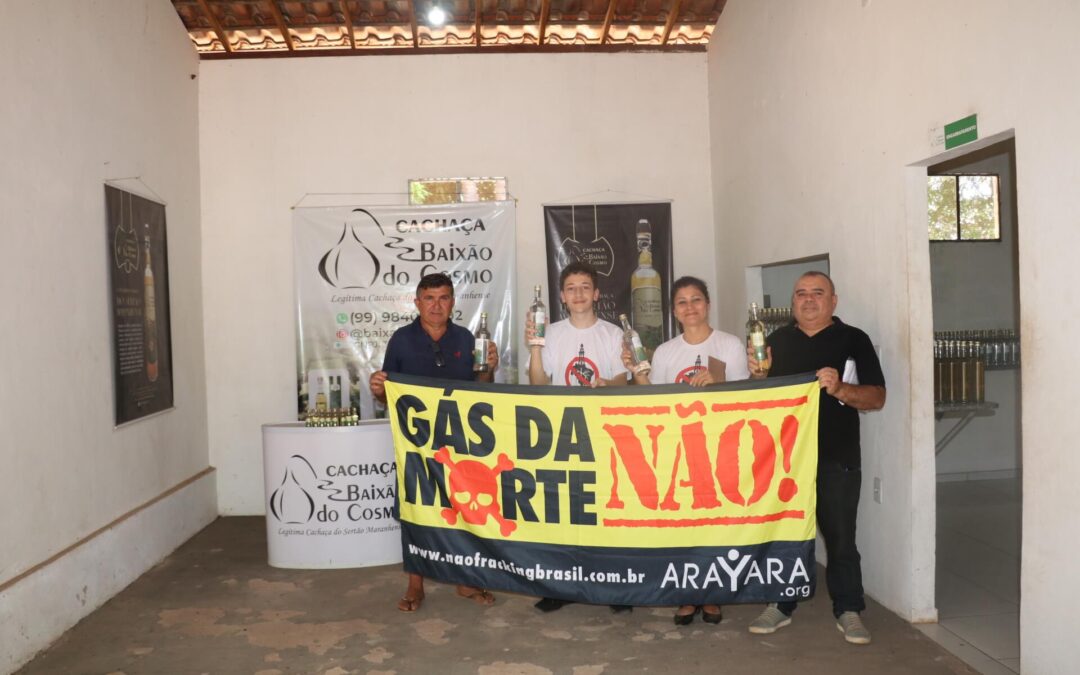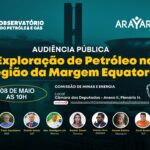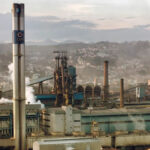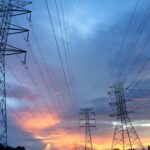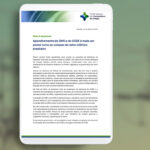
por Comunicação Arayara | set 13, 2022 | Fracking |
No Fracking Brazil team visited the Mata do Seu Albertino and Mata das Tabocas to take statements from the residents
What is fracking?
Fracking – also called hydraulic fracturing – is a process that involves injecting large volumes of water, chemicals and sand at high pressure into layers of rock underground to release trapped natural gas. Although it is a technique already in use in several countries, it is controversial for causing environmental and ecological damage, including groundwater contamination, release of greenhouse gases, induced earthquakes, etc.
Water scarcity is a reality faced by many communities in Brazil. However, in places like Mata das Tabocas and Mata do Seu Albertino, located in São João dos Patos, Maranhão, the lack of water reaches alarming levels and has caused a significant rural exodus, with former residents seeking better living conditions. The team from COESUS – Coalition No Fracking Brazil for Water and Life, a campaign of the Arayara International Institute, was present in the communities on September 13, 2022 to interview and make recordings in order to understand the reality faced by local residents.
One of the residents of Mata das Tabocas, Mrs. Balbina, told the COESUS team about the difficulty of living without water:
“Meus meninos vieram semana passada e não tinha água nem para lavar as mãos”, lamentou ela.

Dona Balbina, moradora da Mata das Tabocas.
Enquanto empresas petrolíferas manifestam interesse em instalar o fracking na região, técnica que consome milhões de litros de água potável, histórias como a de Dona Balbina se tornam cada vez mais comuns nas áreas que foram leiloadas para essa prática.
As petrolíferas escolhem regiões que já enfrentam intensamente a crise climática e o racismo ambiental, pois assim conseguem operar com mais facilidade, passando despercebidas pelo governo e pela mídia. No entanto, a população local, que sofre diretamente com as ações dessas empresas, não se cala e se posiciona firmemente contra o fracking, rejeitando o chamado “gás da morte”.
Environmental racism occurs when the population of a given region is disproportionately harmed by the installation of polluting industries or by extractive activities that compromise the environment. These communities, usually composed of low-income people and minority ethnic groups, face negative environmental impacts in their daily lives, from water and soil contamination to degradation of health and quality of life.
Mrs Sebastiana, another resident of the forest, showed her house and explained how the water catchment system works through cisterns and how it has evolved over time. In the past, water was stored in holes dug in the ground, exposed to the soil. Over the years they started using tarpaulins to cover the hole, and more recently they have started using cisterns, which collect the rainwater that runs off the roof. However, it is important to note that the region faces long periods of drought, practically without rain during several months of the year. Mrs. Sebastiana’s family is aware of the research being done to exploit the gas from fracking.

Member of No Fracking Brazil seeing the cistern functioning.

por Comunicação Arayara | set 13, 2022 | Fracking |
Meeting took place to affirm commitment to Faith, Peace and Climate
What is fracking?
Fracking – also called hydraulic fracturing – is a process that involves injecting large volumes of water, chemicals and sand at high pressure into underground rock layers to release trapped natural gas. Despite being a technique already used in several countries, it is controversial because it causes environmental and ecological damage, including contamination of groundwater, release of greenhouse gases, induced earthquakes, etc.
COESUS – Coalition No Fracking Brazil for Water and Life, a campaign by the Arayara International Institute, maintains a partnership with the Catholic Church in defense of life and against the so-called “Gas of Death”. In each city that COESUS visits, the local church is sought to reaffirm the partnership established in defense of the planet and the protection of life.
On September 13, 2022, Não Fracking Brasil had the opportunity to talk to Father Francielio, from São João dos Patos, Maranhão. The priest made himself available to the team to help raise awareness and introduced them to the Bishop of Caxias, Dom Sebastião. The pontiff invited the COESUS team and its representative, Dalcio Costa, to participate in the X Youth Pilgrimage and talk to the young people present about the impacts of fracking at work and in life. The theme of the pilgrimage was “Our Shout is for Work and Life” .
In addition, the team also had the opportunity to talk with the Bishop of Balsas, Dom Valentim. During the meeting, he reinforced the fight against fracking and shared about a project he initiated to plant 8 million trees.
The presence of COESUS in religious communities is extremely important, as awareness of the dangers of fracking and the defense of the environment are closely linked to the values of faith and peace. The church plays a fundamental role in raising the awareness of the faithful and in promoting concrete actions in favor of preserving the planet.
In this sense, the partnership between COESUS and religious leaders strengthens the message of protection for the “common home” and life in all its forms. The awareness of young people, in particular, is essential, as they are the ones who will inherit the future and will face the impacts of decisions made today.
COESUS maintains its commitment to Dom Sebastião, Dom Valentim and many other religious leaders in defense of the environment and against fracking.

por Comunicação Arayara | set 13, 2022 | Fracking |
NOTA
Date: September 13, 2022
What is fracking?
Fracking – also called hydraulic fracturing – is a process that involves injecting large volumes of water, chemicals and sand at high pressure into underground rock layers to release trapped natural gas. Despite being a technique already used in several countries, it is controversial because it causes environmental and ecological damage, including contamination of groundwater, release of greenhouse gases, induced earthquakes, etc.
COESUS – Coalition No Fracking Brazil for Water and Life, a campaign by the Arayara International Institute, was present at Quilombo de Faveira, located in São João dos Patos, in the state of Maranhão, to carry out an important training course with 32 residents. The objective of the meeting was to inform and make the community aware of the impacts of Fracking.
During the training, COESUS representatives presented information and scientific evidence that demonstrate the risks associated with Fracking, in addition to sharing experiences from other regions where the technique is already in operation. The aim was to provide subsidies so that the residents of Quilombo de Faveira could understand the potential impacts and make informed decisions about the preservation of their territories.
COESUS highlighted the importance of uniting and mobilizing the community to face the challenges brought by Fracking, emphasizing that defending our common home and protecting the environment are everyone’s responsibility. Residents of Quilombo de Faveira showed great interest and engagement during the training, demonstrating their determination to protect their territory and ensure a sustainable future for generations to come.
The exchange of information and experiences strengthened the ties between the community and COESUS, reaffirming the importance of partnerships for building an increasingly solid movement in defense of the environment.

por Comunicação Arayara | set 13, 2022 | Fracking |
Excessive water consumption by the method and soil contamination are among the causes
What is fracking?
Fracking – also called hydraulic fracturing – is a process that involves injecting large volumes of water, chemicals and sand at high pressure into underground rock layers to release trapped natural gas. Despite being a technique already used in several countries, it is controversial because it causes environmental and ecological damage, including contamination of groundwater, release of greenhouse gases, induced earthquakes, etc.
The oil industry is one of the greatest threats to the health of our planet. According to the UN, the oil sector is the main contributor to the worsening climate change. In addition, this industry depends on a resource that is the most valuable for life: water. In the case of fracking, millions of liters of potable water are used, which competes directly with other industries, agribusiness and the general population.
One of the sectors strongly affected by fracking is the production of beverages, such as cachaça and beer. Soil contamination – where barley and the grains used to produce the drink are grown – and the quality of water from aquifers are factors of great concern for production.
The team from COESUS – Coalition No Fracking Brazil for Water and Life, a campaign by the Arayara International Institute, visited, on September 13, 2022, the Baixão do Cosmo brandy factory, where they could observe all the cachaça production and talk to the owner about the impacts that fracking could generate in his sector. The group highlighted to the owner of the Baixão do Cosmo brandy factory the risks that fracking represents for his business and also for the environment.
Soil and groundwater contamination can compromise the quality of the inputs used in the manufacture of the drink, directly affecting the taste and safety of the final product. Furthermore, the scarcity of potable water, caused by the excessive use of this resource in fracking, can impact the entire production chain.
Faced with the challenges faced by the beverage industry and other activities that depend on water as an essential resource, it is necessary to stop the shale gas exploration model and seek more sustainable alternatives that are less harmful to the environment. The preservation of water and the promotion of renewable energies are essential ways to guarantee a future for society.

por Comunicação Arayara | set 13, 2022 | Fracking |
NOTE
September 13, 2022
What is fracking?
Fracking – also called hydraulic fracturing – is a process that involves injecting large volumes of water, chemicals and sand at high pressure into underground rock layers to release trapped natural gas. Despite being a technique already used in several countries, it is controversial because it causes environmental and ecological damage, including contamination of groundwater, release of greenhouse gases, induced earthquakes, etc.
COESUS – Coalition No Fracking Brazil for Water and Life, a campaign by the Arayara International Institute, is engaged in a struggle that goes beyond political or economic issues. It is a struggle for life, health and the future. For this, the coalition unites people of various beliefs in favor of a greater purpose: taking care of the planet. Since the beginning, COESUS’ partnership with churches, religious temples and sacred places has been a reality, since the defense of the environment is everyone’s responsibility.
Combating fracking is saying yes to life, it is saying that we want a planet where we can live in harmony with nature, with animals. It’s wanting to drink clean water, eat food free of toxic chemicals from fracking, and breathe clean air.
During the No Fracking Brazil campaign, COESUS visited hundreds of churches in more than 17 Brazilian states, raising awareness about the dangers of shale gas extraction. With that, he found allies in the defense of life, such as the Catholic Church, represented by the CNBB – National Conference of Bishops of Brazil, several evangelical churches, among others.
In the municipality of Sucupira do Riachão, in Maranhão, the COESUS team met with Pastor Pantaleão, leader of the church “O Senhor é o meu Pastor”, who repudiated fracking and pledged to take the word of defense of life to his congregation.
The active participation of religious institutions in this struggle is extremely important, as they play a fundamental role in raising awareness and promoting ethical and spiritual values. By embracing the cause of protecting the environment and fighting fracking, churches and their leaders demonstrate a commitment to life.
COESUS recognizes the importance of these partnerships and remains committed to promoting awareness about the negative impacts of fracking and the need to seek more sustainable energy alternatives. The joint work between the coalition and religious institutions strengthens the message of preserving life and reinforces the importance of taking care of our common home.
